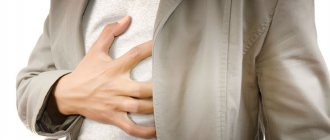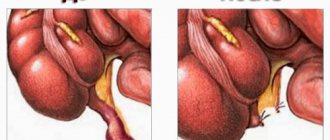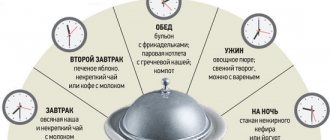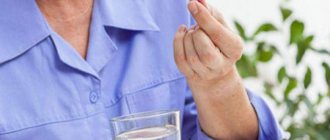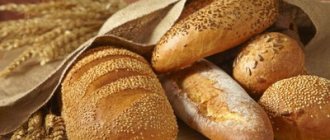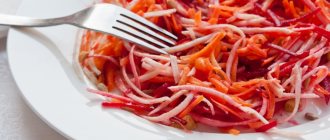The article was prepared by a specialist for informational purposes only. We urge you not to self-medicate. When the first symptoms appear, consult a doctor.
Heartburn is a feeling of discomfort or a feeling of heat, a burning sensation behind the sternum, spreading upward from the epigastric (epigastric) region along the esophagus. Heartburn occurs periodically, usually an hour after eating, especially if the food was rich and spicy. Less commonly, it occurs during physical activity, when bending the body or in a horizontal position.
Usually, to relieve (stop) heartburn, it is enough to drink water; you can stop heartburn by taking antacids (substances that neutralize the effect of acid). However, attacks of heartburn can recur quite often and disrupt a normal lifestyle.
Heartburn that bothers a person more than three times a week significantly worsens the quality of life. Although there is some relationship between the periods of heartburn, the duration of esophageal clearance and the presence or absence of damage to the esophageal mucosa, this is not always clear-cut. Some patients suffering from severe esophagitis (inflammation of the esophageal mucosa) do not complain of heartburn.
Heartburn can accompany gastritis with high acidity, peptic ulcer of the stomach and duodenum, cholecystitis, toxicosis of pregnant women, occurs with diaphragmatic hernia, and intolerance to certain nutrients. If heartburn is combined with belching (especially sour), this may be a sign of gastritis or gastric ulcer. If the pain gets worse when lying down, then the problem is probably in the esophagus.
Causes of heartburn
The causes of heartburn are increased acidity of the stomach, less often - special sensitivity of the mucous membrane of the esophagus and stomach with low acidity. Heartburn is often accompanied by stomach diseases, but can also occur with neuropsychiatric disorders after eating.
Poor diet and unhealthy lifestyle aggravate heartburn and are among the most common causes.
- Smoking, alcohol, carbonated drinks, coffee and hot spices in large quantities irritate the stomach lining, which leads to an increase in acid and relaxation of the stomach valve.
- Heartburn is provoked by eating large quantities of citrus fruits, tomatoes, various pickles, fresh bread, pies and fried foods.
- Overeating stretches the stomach and causes excessive acid secretion.
- Taking drugs such as aspirin, ibuprofen, ortofen and some others provokes increased acid production in the stomach and the reflux of acidic contents into the esophagus.
- Wearing tight belts, lifting weights, pregnancy, and excess weight increase intra-abdominal pressure, which leads to heartburn.
- Sleeping after eating can cause heartburn.
- Stress and neuroses, especially those accompanied by anxiety, are also one of the reasons.
Preventive methods
Prevention of a burning sensation behind the sternum that extends into the throat is to limit food in the evening four hours before bedtime. In this case, dinner should be light, with the exception of fried, fatty foods and hot spices. In the morning, avoid caffeine, chocolate and sweets on an empty stomach. Drinking alcohol and smoking tobacco in the evening are also prohibited. It is noteworthy that you cannot smoke on an empty stomach.
When visiting a gastroenterologist, ask about medications against heartburn. Regular medical examination (at least once every 6 months) will allow you to monitor the condition of the internal organs and the gastrointestinal tract system. This applies especially to those patients who experience heartburn in the morning on a regular basis. Such methods, coupled with adequate drug therapy, can eliminate unpleasant symptoms and prevent the development of gastrointestinal diseases.
Triggers for heartburn
- Food in large quantities, especially fatty foods.
- Overweight.
- Rest in a horizontal position after eating.
- Smoking.
- Alcohol.
- Soda drinks.
- Mint.
- Chocolate.
- Strong coffee and tea.
- Medicines to lower blood pressure and relax smooth muscles.
Heartburn after every meal
Regular heartburn after eating should not be considered a separate problem. This unpleasant symptom mainly indicates diseases of the gastrointestinal tract.
A list of some diseases and conditions that cause heartburn after each meal:
- Peptic ulcer of the stomach or duodenum;
- A hiatal hernia in which part of the stomach, and in some cases loops of intestine, are displaced into the chest cavity through the food opening in the lower part of the esophagus. With insufficient functioning of the obturator mechanisms, the main concomitant symptom of this disorder is regular heartburn after eating;
- Gastritis with hypersecretion is also accompanied by painful and persistent heartburn after eating due to the penetration of acidic stomach contents into the esophagus;
- Duodenitis – inflammation of the duodenum;
- Inflammation of the gallbladder (cholecystitis);
- Obesity - excess fat in the abdominal cavity creates significant pressure inside the stomach, as a result of which its contents enter the esophagus;
- Gastroesophageal reflux disease (GERD), in which the lower esophageal sphincter is disrupted and stomach contents are regularly thrown into the esophagus;
- The consequences of removal of the gallbladder, part of the duodenum or stomach during the surgical treatment of peptic ulcers and gastric cancer also cause the entry of juice containing liver and pancreatic enzymes into the esophagus;
- Pregnancy, as well as obesity, leads to increased intragastric pressure. In addition, changes in hormonal balance can also affect the adequate functioning of the lower esophageal sphincter and the gastrointestinal tract as a whole;
- Angina pectoris is accompanied by a specific pain that can be confused with heartburn.
Regular heartburn after eating is a serious reason to consult a gastroenterologist. Self-medication, in this case, is not permissible, as it can lead to dire consequences.
Pathological causes of heartburn in the morning
Heartburn in the morning after breakfast may indicate pathological processes in the gastrointestinal tract. The main signs of digestive tract disorders are constant heartburn in the morning. This condition requires consultation with a gastroenterologist.
Often patients, suffering from regular heartburn, try to solve the problem with home methods, using baking soda, cigarette ashes, etc. But it is prohibited to use such independent measures, because there is a possible risk of complications of the underlying disease.
Violation of the structure of gastric juice is caused by various diseases - ulcers, incl. duodenum, malfunction of the pancreas and gall bladder.
However, the most dangerous disease with the symptom of heartburn in the morning is oncology of the gastrointestinal tract. That is why doctors strongly recommend that if you experience periodic episodes of a burning sensation in the throat and chest, seek qualified help and not self-medicate.
In medicine, five main factors have been identified that stimulate the appearance of heartburn in the morning:
- Ulcer, gastritis and inflammation of the esophagus. Burning pain syndrome occurs against the background of changes in the structure of the mucous membrane, which causes erosion. The gastric enzyme acts on the layer and penetrates deeper, corroding the shell. At this moment the patient feels a burning sensation.
- Acute phase of pancreatitis. If you have heartburn every day in the morning, then the cause may relate to the inflammatory process in the pancreas.
- Malignant neoplasms located in the esophagus and stomach.
- Stomach dysfunction. If there is a failure in the motor process of the stomach, stagnation of consumed food occurs. For this reason, fermentation occurs and the patient begins to swell. In the morning, a person is plagued by heartburn, loss of appetite and pain.
In addition, a burning sensation in the esophagus and sternum can occur as a side effect from taking medications. As a rule, such medications are taken orally and indirectly affect the level of gastric juice concentration.
Most often, heartburn attacks occur due to the use of medications such as:
- against inflammation;
- hormonal drugs;
- prescribed to regulate the functioning of the cardiovascular system;
- antihypertensive drugs.
If heartburn occurs while taking medications, it is recommended to talk to your doctor about changing the drug.
Heartburn and belching
Heartburn in the morning on an empty stomach with characteristic belching occurs against the background of the following cause-and-effect relationships:
- High levels of trapped air where excess air needs to be released. This provokes pressure in the peritoneum and stimulates muscle contraction. Thus, air leaves the body through the oral cavity and esophagus. The process is not dangerous and is considered normal for a person in good health.
- Belching with heartburn often becomes a pregnancy companion. The reason is changes at the hormonal level, as well as the intense pressure exerted on the diaphragm by the growing fetus.
- Disruption of the gastrointestinal tract or malfunction of the muscles located between the stomach and duodenum. With such a disruption of the activity of the pylorus or the lower esophageal sphincter not working fully, heartburn occurs after belching.
- Neurotic conditions stimulate heartburn with belching. So, during an emotional dialogue, a person grabs a large volume of air through his mouth. Subsequently, the excess, without fail, leaves the body.
Heartburn and stomach pain
Almost all of the above conditions or diseases, with minor differences, can cause heartburn and stomach pain; let’s look at them in more detail:
- chronic hyperacid gastritis
is always accompanied by persistent heartburn, which appears as a result of the reflux of gastric juice containing acid into the esophagus, irritating and inflaming its mucous membrane. In some cases, heartburn can be the equivalent of pain that occurs one and a half to two hours after eating;
- duodenitis
– pain is felt constantly, but is especially intensified after eating when there are “errors” in the diet; heartburn is their faithful companion. However, pain gradually decreases, but heartburn and bloating remain and, of course, negatively affect the quality of life;
- chronic cholecystitis
characterized by a combination of heartburn and pain in the right upper part of the stomach. As a rule, they occur after eating fatty foods or shaking while driving a vehicle;
- peptic ulcer.
Heartburn and stomach pain may also indicate this disease;
- hiatal hernia.
In this case, pain appears when a person takes a horizontal position or when bending over. It is localized in the stomach and can radiate to the heart or back and be accompanied by heartburn, but the pain goes away as soon as the person assumes an upright position;
- GERD
also accompanied by pain in the upper part of the stomach and heartburn;
- pregnancy.
A companion to this condition can be gastritis with high acidity, accompanied by all the characteristic symptoms;
- digestive disorders.
Most often, causeless pain in the stomach, accompanied by heartburn, belching, and sometimes nausea, is the lot of young people. They can be caused by impaired contraction of the walls of the gallbladder, intestines or stomach, as well as the production of excess acid.
Feeling of heartburn in the throat
This phenomenon occurs due to the ingress of gastric juices onto the mucous membrane of the esophagus due to impaired motility of the duodenum, stomach or esophagus, when its lower sphincter does not work adequately.
The pH of the walls of the esophagus is at a neutral level, and the acid contained in the gastric juice irritates and burns the esophageal mucosa.
Acid provokes inflammatory processes
which can lead to erosions and ulcers of the esophagus. The result can be bleeding, and in some severe cases, even rupture of the walls of the esophagus, which pose a threat to life.
Scarring of ulcers leads to a narrowing of the esophagus, in which a person feels an impassable lump in the throat and experiences difficulty swallowing food. This condition not only brings discomfort to life, but can also become an indication for complex surgery and increases the risk of developing esophageal cancer.
Feelings of heartburn in the throat can also be experienced by completely healthy people with various dietary disorders. However, attacks in such cases occur extremely rarely.
Pregnant women, as mentioned above, also suffer from heartburn very often. Attacks of heartburn are typical for the second half of pregnancy, when the already large fetus puts pressure on the esophageal sphincter, opening it slightly.
Causes of morning heartburn
The rare occurrence of heartburn, which occurs without an accompanying symptomatic picture, is less associated with pathological processes in the body. Factors influencing the occurrence of burning include a heavy and fatty dinner, the use of hot spices, etc. However, if you have heartburn in the morning, then the reasons should be examined, because... this may indicate a gastrointestinal tract illness.
Eating disorder
Self-administered first aid is to limit the consumption of carcinogens and foods high in cholesterol. If there is heartburn in the morning, both before and after breakfast, it is suggested to exclude such foods before bedtime as:
- fatty and fried foods;
- broths cooked with meat;
- smoked products;
- sour foods, incl. vegetables and fruits;
- spicy food, incl. vegetable, sauces and gravies.
Morning torment from a burning sensation often occurs against the backdrop of evening feasts with heavy alcohol consumption, smoothly flowing into the night. After drinking alcohol-containing drinks, the concentration of hydrochloric acid in the gastric juice doubles. In turn, this becomes an unpleasant consequence after waking up.
Excessive consumption of strong coffee on an empty stomach has a similar effect.
Tobacco smoking
Heartburn in the morning after sleep is also a consequence of addiction to tobacco. Discomfort in the esophagus at night or in the morning is diagnosed in 85% of smokers. Those who smoke on an empty stomach are especially susceptible to this phenomenon.
This is due to the fact that when nicotine enters the stomach, the production of gastromucoprotein is stimulated. The enzyme immediately begins its mission - to digest food. And in the absence of one, the stomach, conditionally, eats itself. As a rule, this occurs due to smoking after a hearty meal.
When gastromucoprotein is released on an empty stomach, the enzyme is not subsequently eliminated by food. Moreover, if nicotine gets into the esophagus and intestines, heartburn, chronic gastritis and ulcers are guaranteed. In view of this, doctors do not recommend smoking on an empty stomach, but only after breakfast.
During pregnancy
Pregnancy also provokes heartburn in a woman in the morning. Scientific research in this area indicates that up to 75% of expectant mothers experience discomfort in the final stages. There are several factors influencing this condition.
First of all, this is a growing child in the stomach, putting pressure on organs, incl. and stomach. Secondly, changes at the hormonal level affecting the gastrointestinal tract. The third trimester always occurs under the auspices of increased production of progesterone, which relaxes the cervix and esophageal sphincter.
In view of this, a pregnant woman will often suffer from heartburn in the morning in the last stages. In this case, sleep is disturbed even during sleep due to an unpleasant burning sensation from the passage of gastric juice into the esophagus.
How to get rid of heartburn?
The recipes below can be used to relieve the “attacks” of heartburn, or used as aids in the treatment of digestive system disorders accompanied by heartburn. But they cannot replace the main treatment prescribed by a specialist.
- Almond.
As strange as it may sound, almonds can neutralize stomach acid. Chewing this nut thoroughly is a very effective remedy for heartburn. Almonds need to be doused with boiling water to make the skin easier to remove, and chewed. A little patience and the heartburn will “go away” [source]. It is recommended to soak almonds in water for 12 hours before consuming.
- Bananas.
Eating a banana can actually help cure heartburn as well as almonds. Banana contains natural anti-acids.
- Ginger.
Ginger can relieve nausea and also reduce heartburn. You can add grated ginger to your prepared dishes, or make ginger tea
- Chewing gum.
According to a 2014 study, chewing gum within half an hour after eating may also help reduce heartburn. Gum that contains bicarbonate appears to be particularly effective.
- Soda.
Baking soda can help you neutralize hydrochloric acid in your stomach and relieve heartburn symptoms (1/2 level teaspoon per glass of water). It is very important to drink soda slowly, in small sips! If you drink it quickly, the situation will worsen (a new release of hydrochloric acid from the stomach).
Baking soda is not safe, use it only in emergency situations! There is an effect after using soda, since the acidity actually decreases sharply. But when it enters the body in excess, in response, the stomach begins to produce hydrochloric acid with redoubled aggression, and the attack of heartburn intensifies.
Moreover, soda should not be taken frequently; excess soda in the body leads to potassium deficiency (this will immediately affect the heart), convulsions and exacerbation of kidney disease are possible. Nausea, gas, diarrhea and intestinal pain are also possible as side effects.
- Flax-seed.
Pour half a glass of boiling water over a teaspoon of seed. It is more convenient to prepare in the evening so that the infusion is ready in the morning. Before drinking, bring the resulting drink to a full glass and drink on an empty stomach for at least 14 days. You can use a simpler recipe. Grind the flax seeds and, as soon as heartburn begins, pour a teaspoon of powder into a glass of warm water and drink in small sips.
- Chaga mushroom.
Another excellent auxiliary remedy for the treatment of diseases of the digestive tract is birch mushroom or chaga (the drug befungin is produced based on chaga). How to grow chaga mushroom?
How to treat
Medical experts note that treating heartburn at an early stage can neutralize unpleasant symptoms and stop the narrowing of the esophagus, which provokes failure of the organ.
The specifics of the treatment are as follows:
- Compliance with dietary nutrition is the principle of rehabilitation therapy. Gastroenterologists advise consuming food in small doses 5-6 times a day, i.e. switch to fractional mode.
- Have breakfast only with foods that do not irritate the lining of the stomach. In addition, after eating, take an exclusively vertical position for an hour, eliminating the desire to lie down.
- Taking medications. These medications include antifoaming agents that reduce bloating. For example, “Espumizan”, “Milicon”, etc. To relieve heartburn in children, doctors strongly recommend taking carminatives. However, such medications only relieve symptoms and do not eliminate the cause, i.e. adequately taken in isolated cases.
The following table of medications allows you to adequately select a medicine to relieve symptoms of heartburn. Before use, you should consult a gastroenterologist.
| Name | Impact | Indications for use | Contraindications | Possible side effects |
| Antacids | ||||
| Almagel | Effectively eliminates heartburn. Eliminates burning sensation and bloating. | Diseases in the field of gastroenterology: • gastritis; • casting; • hiatal hernia; • colitis; • and others. | Strictly prohibited for children under 12 years of age, women during pregnancy and during breastfeeding. | Individual intolerance to the components included in the composition. Mild form of headache syndrome. |
| Maalox | Neutralizes stomach hydrochloric acid. Reduces pH. Envelops the mucous membrane, preventing recurrent heartburn. | Exacerbation of ulcers of the duodenum and stomach. Gastroduodenitis of all forms. | Possible dermatitis. Muscle pain. | |
| Rennie | Fast and long-lasting elimination of hydrochloric acid. Protection of the mucous membrane. | Signs of high gastric acidity. Heartburn with sour belching. | Muscle pain syndrome. | |
| Gelusil | Envelops the gastric mucosa. Adsorbs. Acts as a remedy against toxins. | Gastritis in acute and chronic form. Ulcer. Hiatal hernia. Heartburn. | In rare cases - nausea, diarrhea, constipation. | |
| Antisecretory drugs | ||||
| Omeprazole | Affects the body for up to 9 hours. Prevent recurrence of heartburn. To treat burning sensation in children, it is released in the form of a suspension. | Take no more than 1 time per day. Take only with a doctor's prescription. | Combination with other medications containing high iron content is strictly prohibited. | Drowsiness, headaches, risk of hepatitis, diarrhea and more. |
| Rabeprazole | It has a blocking effect on the final formation of hydrochloric acid. | For stomach and duodenal ulcers, as well as gastroesophageal reflux. | Combining the drug with aspirin and the antibiotic tetracycline is not allowed. | Abdominal pain, diarrhea, nausea with vomiting. Dizziness and headache, sleep disturbance. Rarely – depressive states. |
| Esomeprazole | Blocks the development of hydrochloric acid. | Preventive measures for recurrent esophagitis. Peptic ulcer of the stomach and duodenum. Heartburn with belching. | Concomitant use with Propranol and Indomethacin is prohibited. During breastfeeding women. Intolerance to the components included in the medicine. | Often – migraines, stomach pain, diarrhea, bloating, etc. Rarely - the manifestation of allergic reactions, impaired consciousness, changes in taste perception, dryness of the oral mucosa. |
| Gastrointestinal motility stimulants | ||||
| Domperidone | • Increase the process of peristaltic contractions of the stomach and intestines. • Stimulates fecal excretion. • Activate the activity of the lower esophageal sphincter. • Relieves nausea. | For nausea and vomiting of various pathogenesis. Infectious diseases and dietary disorders. During chemotherapy procedures. | • Bleeding from the gastrointestinal tract. • Intestinal obstruction in mechanical form. • Perforation of the gastrointestinal tract. • Breastfeeding period. • For children under 5 years old and weighing less than 20 kg. • And also other things. | Intestinal disorders and spasms. Skin rash. |
| Motilak | The drug is prescribed against vomiting, to speed up bowel movements. For heartburn. And also with belching and bloating. | The medication should not be taken by children under 5 years of age. And also for persons with high sensitivity to the composition of the drug. | Stomach cramps, rash, itchy skin. In rare cases, galactorrhea. | |
| Motilium | Anti-vomiting, the medicine stimulates pressure in the esophagus, stimulating the process of emptying. | Contraindicated in patients with a tumor in the pituitary gland. For bleeding from the gastrointestinal tract and mechanical intestinal obstruction. | Gastrointestinal disorders, cramps, increased fatigue, head pain. | |
| Heartburn medicine for pregnant women | ||||
| Phosphalugel | Eliminates the effects of hydrochloric acid and creates a protective layer. | Peptic ulcer disease, gastritis due to high acidity, acute pancreatitis, etc. | Kidney failure, Alzheimer's syndrome and more. | Nausea accompanied by vomiting. Impaired sense of taste and more. |
| Gasterin | Adsorbs and has an enveloping effect on the gastric mucosa. | Gastritis in chronic and acute form. poisoning of various etiologies, etc. | Hypersensitivity to the components of the drug. Gestation and breastfeeding time, as well as others. | Constipation, allergies, nausea, thirst, etc. |
Attention! For detailed information about the medications presented in the table, read the instructions.
Taking medications while consuming alcoholic beverages is strictly prohibited. Otherwise, a person will receive unpredictable reactions, incl. kidney dysfunction.
Traditional medicine recipes
Every year the number of people who prefer the methods of folk health is increasing. This is due to the fact that the drugs are prepared from available components, with a low level of contraindications and, especially, side effects.
Popular decoctions and infusions against heartburn include:
- Cabbage. If the morning begins with heartburn, then fresh juice from cabbage leaves will help cope with the burning sensation in the chest.
- Honey made from apples. Select ripe apples, rinse and peel the fruit. Chop finely and add water. Place the container on the fire to simmer for 3 hours. After the specified time, the mixture will darken and thicken. Then cool and store in the refrigerator. Drink 50 grams in the morning.
- Almond. It is not recommended to consume on an empty stomach. Take during the day after heartburn appears in the chest. It is possible to replace it with walnut.
- Oatmeal or barley. Make porridge in the morning for breakfast.
- Consume potato juice on an empty stomach.
Apples are recommended as preventive measures.
What to do if you have severe heartburn?
Home remedies are definitely a good thing. But what to do when severe heartburn “attacks” precisely at that moment, when there is not enough time to prepare infusions and decoctions, you won’t be able to see a doctor urgently, but you need relief right now?
Pharmaceutical drugs called antacids will come to the rescue::
- Rennie,
- Phosphalugel,
- Almagel,
- Gaviscon,
- Maalox and other drugs.
But we should not forget about their side effects: constipation, diarrhea and other unpleasant consequences. In addition, they flush calcium from the body.
Therefore, we strongly recommend not to self-medicate frequent heartburn. It is better to consult a doctor, undergo a detailed examination and carry out the correct treatment.
Diet for heartburn
Let's figure out which foods should be preferred for heartburn, and which foods should be avoided.
Steamed dishes, as well as baked and boiled vegetables, are much healthier:
- carrot,
- potato,
- peas,
- lentils.
It is necessary to include foods containing complex carbohydrates in the menu:
- durum wheat pasta;
- bran or corn bread,
- brown rice
Your “correct” diet will be incomplete without:
- low-fat cheeses, sour cream and cottage cheese;
- fish;
- lean meat;
- hard-boiled or soft-boiled eggs;
- various porridges: semolina, buckwheat, oatmeal;
- apples and bananas;
- non-carbonated mineral water (preferably alkaline), compote of non-acidic berries and fruits, green tea.
What you have to sacrifice:
- fried, salty, spicy and fatty, no “salt with layers” or bacon;
- full-fat sour cream, cottage cheese, kefir;
- oranges, limes and lemons. They contain acid that significantly increases stomach acidity;
- baked goods and confectionery products;
- chocolate;
- hot spices and seasonings;
- scrambled eggs and fried omelet;
- tomato paste;
- strong coffee and tea;
- alcohol;
- carbonated drinks.
But diet is half the battle. Heartburn can be caused by overeating. Food must be consumed correctly:
- Eat small portions, but often, 5-6 times during the day.
- The process itself should be leisurely, allowing you to chew food thoroughly.
- Last meal no later than 19.00.
- You should not take a horizontal position for at least 40 minutes after eating.
- You need to drink about 2 liters of water per day, evenly distributing this amount.
Symptoms
The occurrence of heartburn in rare moments is often harmless. Attacks occur both in the morning and at night, while the person can sleep normally. In the morning, the condition worsens and the presence of heartburn is indicated by a sour taste in the mouth or bitterness.
The main symptom of heartburn is burning and pain in the chest area. Acute forms of gastrointestinal disease are accompanied by:
- suffocation;
- severe cough;
- hoarse voice;
- permanent pain during swallowing.
Important! A genetic predisposition to heartburn contributes to the development of respiratory ailments.
Attacks of morning heartburn, as a rule, haunt a person for 2 hours or more. Most often, the release of acid from the stomach is recorded 30 minutes after eating. This condition occurs when the torso is tilted or in a lying position.
Taking these factors into account, doctors note the characteristic signs of heartburn. Thus, it is not difficult to identify the patient’s discomfort and this makes it possible to develop the correct course of treatment or recovery.
